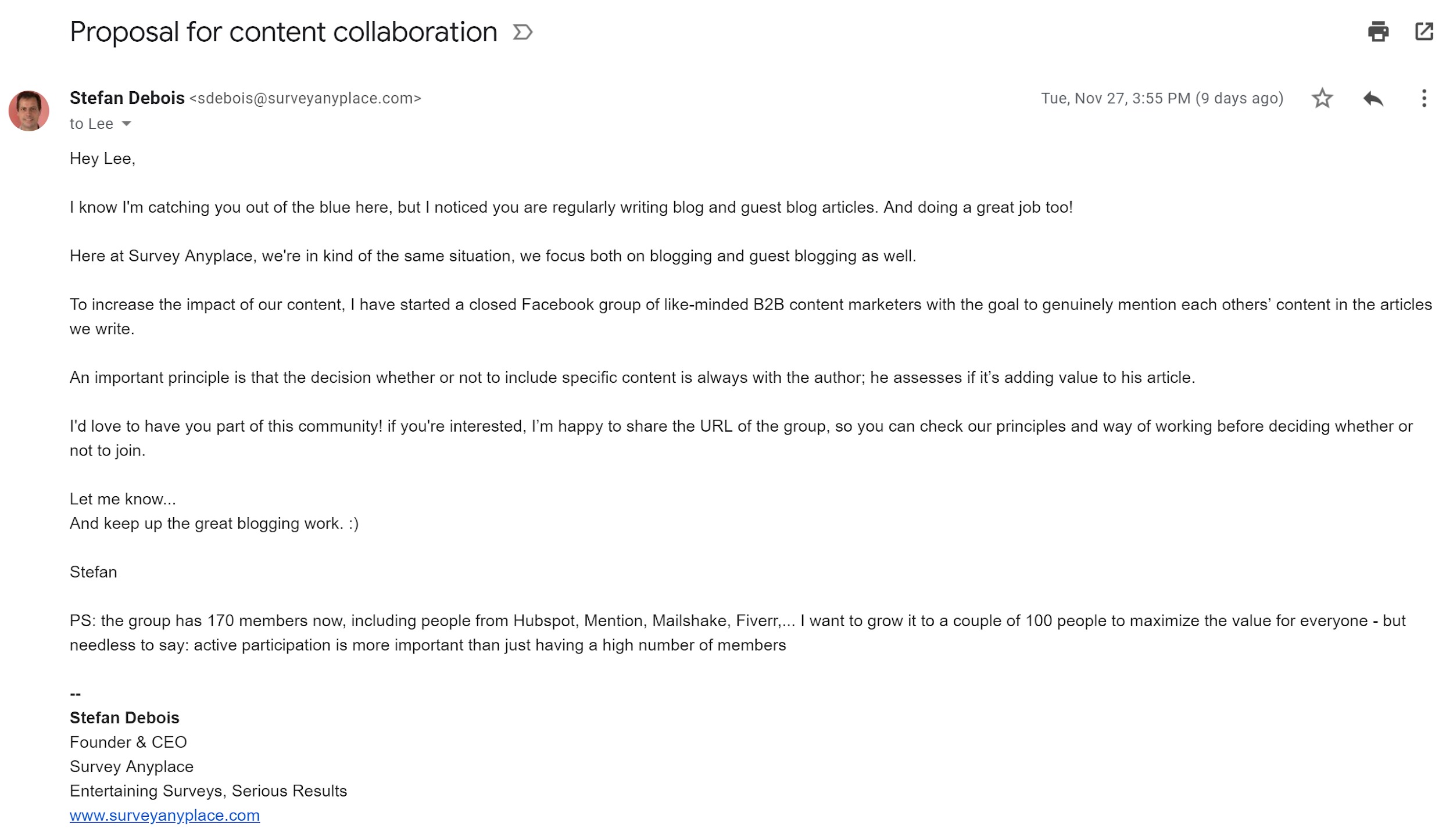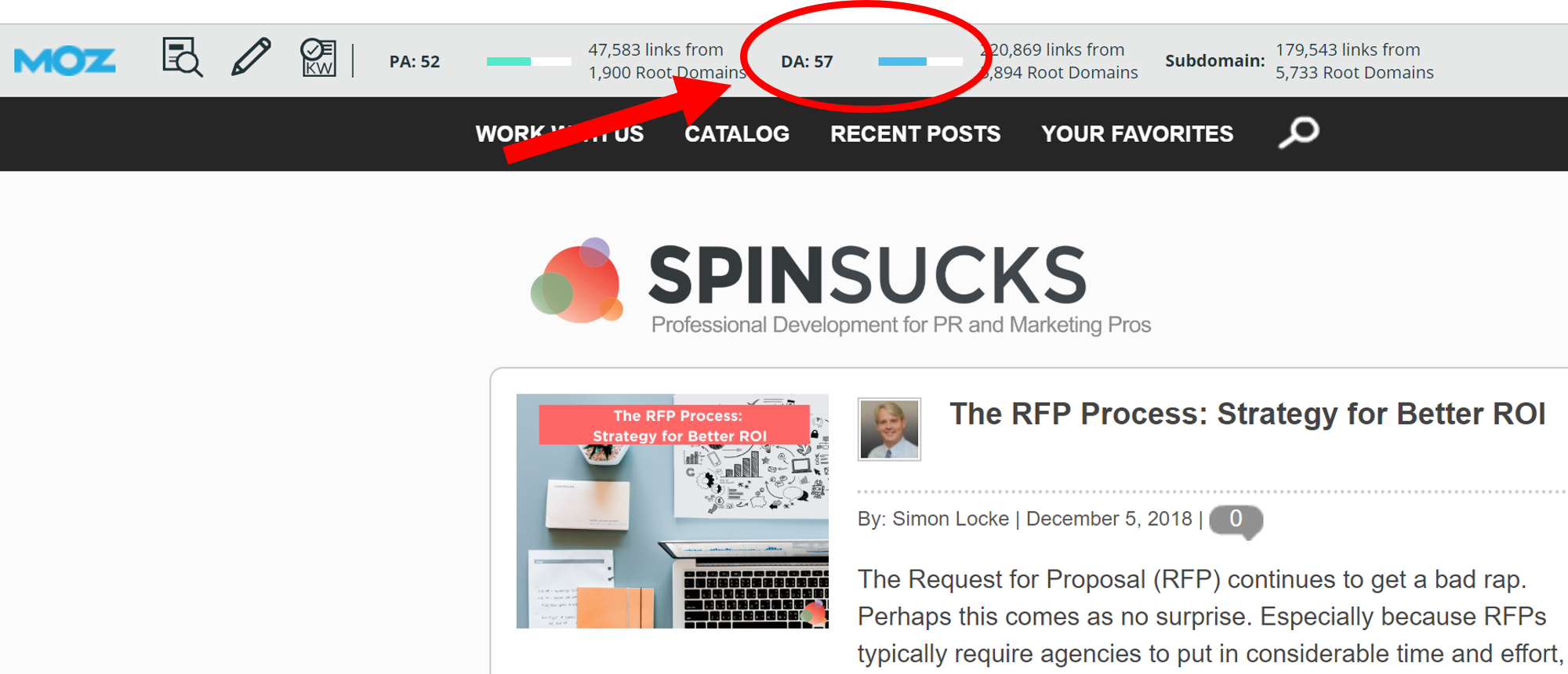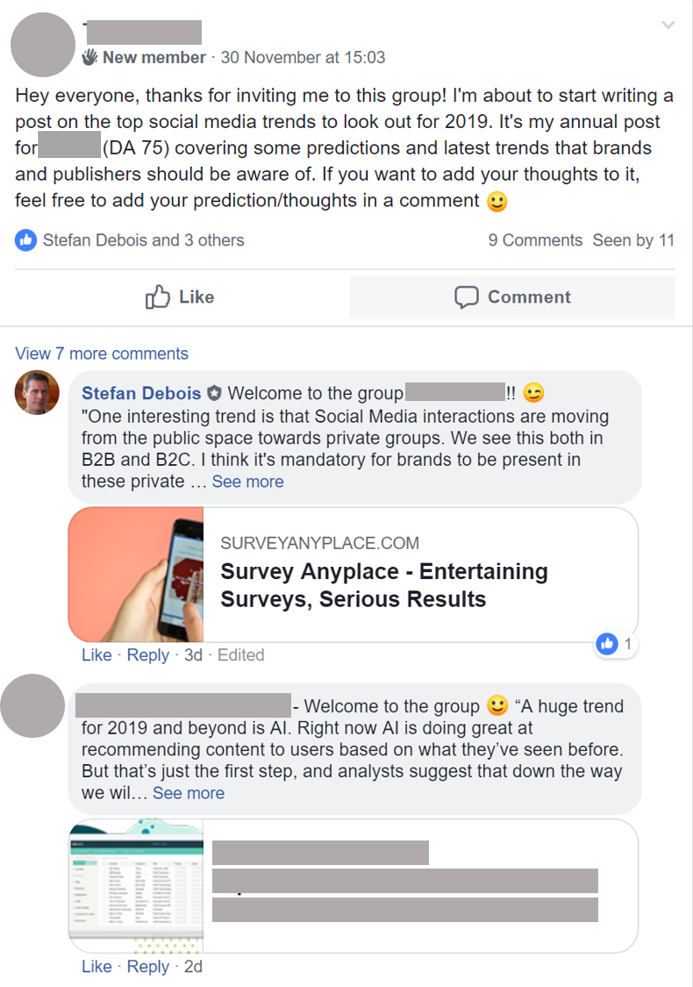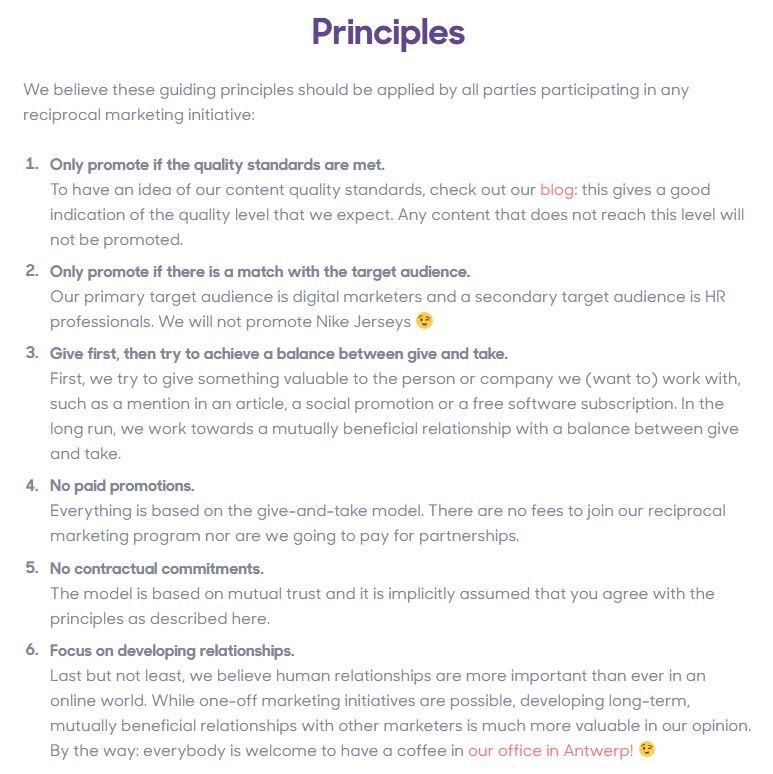 These days, it’s hard for small businesses to be heard online.
These days, it’s hard for small businesses to be heard online.
Google’s “winner-takes-it-all-environment” favors only a fraction of large companies in their search results, making it hard for small businesses to grow their organic reach.
That’s why I chose to start a private online community on Facebook for B2B content marketers.
The goal is to co-create and promote each other’s content and build long-term relationships based on the principle of reciprocity.
Do you invest in content marketing, work for a small business, and care about your digital presence?
Then it’s essential for you to join forces with like-minded businesses and conquer the online world.
So let’s discuss how to get started.
Getting Results from Content Marketing is Hard
Writing an article isn’t that difficult.
But making sure that article returns as much value as what you put into it is very hard.
I was fed up with going through the entire process of reaching out, and then writing and promoting my content, without building long-term, valuable relationships. I wasn’t compounding results from my efforts.
Then I had an idea sprouting from the fact that we receive many guest blog requests for our website.
So after publishing a guest post, we asked the author to return the favor and mention one of our resources in their other guest posts. (But only if it was relevant.)
This is a simple example of applying reciprocity in content marketing.
I took this approach and turned it into a process: The “Principles of Reciprocity.”
Reciprocal marketing has been used for decades. Coke is partnering with Subway to sell more sandwiches and soft drinks. Michael Jordan is partnering with Nike to make some of the most iconic shoes of all time. Instead of building trust with an audience from scratch, you can tap into your partners’ network and get a head start. Reciprocal marketing has been around for so long because it works. – Daniel Ndukwu, Founder and CEO of KyLeads
Use Reciprocal Marketing for Mutual Benefits
Reciprocal marketing includes tactics in which two businesses promote each other’s products or content, thereby, gaining mutual benefit.
I began looking for inspiration in applying reciprocity at scale.
For example, Dunkin’ Donuts was giving away free coffee to area customers whenever the Philadelphia Eagles won a football game.
The offer was only redeemable via the Dunkin’ mobile app, stimulating thousands of customers to download the app and opt-in to receive additional promotional messages.
And they were likely to purchase a donut to accompany their free coffee.
Other examples are online communities based on reciprocity—meetups to exchange knowledge, marketer communities, and businesses coming together to co-create.
It’s kind of reminiscent of the concept of business synergy, where our efforts align, and the sum ends up being greater than the value of the components. Some of the biggest campaigns I’ve run have been through reciprocative plays, and some of the biggest successes I’ve had have been built on the backs of relationships forged through works of mutual benefit. – Alex Birkett, Senior Growth Marketing Manager at Hubspot
What I couldn’t find was a community focusing on a very specific discipline (such as content marketing).
A place where the principle is applied on a larger scale and formatted in a clear process that could be consistently followed by lots of people.
So, I built it myself!
Start with a “Give-First” Mindset
Reciprocity begins with offering something valuable to someone else.
So the first thing to do is think about what you can give fellow bloggers that’s of value to them.
And you should be able to give it freely. This should be done without much effort or cost so you can do this on a large scale.
(If you produce content, it could be backlinks. But it can also be a large subscriber base, a popular roundup where you mention people or free use of a tool or service you’re providing.)
This allows you to ask for something in return which is of equal value to you.
By being generous and always giving something first, you’ll make it very hard for others to refuse you the return favor.
By linking back to people’s content and therefore promoting them without being asked, I become an asset to them. I call it a “give, don’t ask” principle, and it paid its way many times. For example, I’m an active guest blogger; I mention experts and backlink to their tips whenever relevant. Citing Neil Patel and referencing to his case studies brought me a natural backlink from his top-rated blog. People see my natural interest in their content or tools they promote — and spontaneously share my content in turn. – Lesley Vos, Content Strategist at Bid4Papers
Building the Foundation of Our Community
When I first went looking for fellow content marketers, I had point-to-point contact with each of them to see how well we matched.
We sent an email or spoke via Skype.
(I highly recommend using Mailshake to send and follow-up on emails.)
 I described my idea of creating a process around the reciprocity principle and what I expected of the other community members.
I described my idea of creating a process around the reciprocity principle and what I expected of the other community members.
Those who were most interested became the core group of the network.
When looking for people of like-mind, keep this checklist in mind:
- They target sites similar to ones you’re targeting. The idea is you can share your existing resources as additions to their guest articles. This will only work if your content is relevant enough and written for a similar target audience.
- They are frequent guest bloggers (same frequency as you, or more). That’s why it’s wise to look for people with the job title CMO, Marketer, Growth Expert, Content Writer, etc. It provides a certain guarantee they’ll have dedicated time to write quality content.
- They work for a company of a similar size to yours (or slightly bigger).This ensures they have the same amount of qualitative resources at the ready to include in your upcoming piece of content. It’s no use if a contributor only has promotional product pages to link to in your article. And typically, they’ll have similar growth goals and the capacity to meet those goals. An easy way to discover this is by looking at their Domain Authority (DA) via Moz. For example, Spin Sucks = Great DA!

- Ask for previously written articles from each community member. Offering real value is key. Each member should be equally capable of writing quality articles making use of real examples, backing up statements with data, and including links or insights from “smaller” resources.
Keep Relationships Alive via Facebook
Having regular contact with each of these influencers via email can become a very tedious job. Additionally, the network can benefit from working together amongst themselves.
That’s why I began looking for the best platform to build and grow my community.
I’m in a few excellent online communities of marketers and writers. We help each other by providing tips, as well as quotes when necessary. If we’re writing an article, it takes 30 seconds to send a message around these groups. We’re not asking people to promote themselves (conflict of interest). Instead, we’re asking them for favorite tools, services, or strategies. So they’re helping out our readers (and our writers), and we’re giving them a shout out for taking the time. – Patrick Whatman, Content & Communications for Spendesk
I created a closed Facebook group where people share their content pipeline and suggest resources to include in other members’ articles:
- People can post the articles they’re working on and ask for resources they want to include.
- Each member who has a useful content contribution for that topic can share it.
- If they want to be a part of the article, but don’t have a suitable resource, they can provide a quote. This allows them to share their expertise in a different way.
- The content writer has the liberty to choose what they use and add to their article. Always assess relevance.
(This is especially important as the focus is on value and co-creation. An issue you see in many Facebook and LinkedIn groups is the cheap promotion of links that don’t add value.)

The result is a Facebook group with 200+ members and an engagement rate of 82 percent.
It tremendously increased the number of backlinks to our domain on a weekly basis.
Not to mention the side-effects such as joint-webinars, guest blogging opportunities, social promotion, and the valuable, long-lasting relationships that come along with it.
By the way, if you’re reading this thinking you might fit into the group perfectly, you can join the B2B Bloggers Boost Group here.
Managing your Facebook Group
- The setup needs to be a win-win situation for everyone involved. If a post gets no replies, it’s my role as admin to tag people who have something to say on the topic. Or nudge them via email to let them know there is a link opportunity. This is always highly appreciated.
- Have principles and rules and ask everybody to agree on them before joining. You can take a look at our Principles for Reciprocal Marketing here.

- Create a parallel database that includes all your members. It helps you create fuller professional insights on each profile. With a quick search, you can find the best people for an upcoming article. There are specific tools on the market that allow you to manage this efficiently. Using BuzzStream helps us manage the contacts and create personalized outreach to sub-segments.
- Do not accept everybody. Ask for a LinkedIn profile and articles they’ve previously written so you can check to see if their value-add is comparable to yours.
- Tag and email people when there is a link opportunity. It helps keep everyone activated and makes your position stronger as a person who can make connections.
- Follow-up on engagement. Every member should be a regular contributor. Send a friendly email if they’ve been inactive for too long. I also follow-up on which articles the members wrote through BuzzSumo. And I track our backlinks and mentions using SE Ranking.
- Lead by example. Make regular posts for your own guest blogging efforts. And notify users who receive a mention when the post is live.
Empower Your Small Business with Reciprocal Marketing
Smart mutual marketing is the only way small businesses can survive (and thrive) in a highly competitive digital marketing landscape and take down the giants in their space. Go solo and sink or partner and prosper! – Qhubekani Nyathi, Founder and CEO of Wholesome Commerce
Creating the Facebook B2B Bloggers Boost Group has been a great way to get more brand mentions.
By creating your own group, you will have more control over how and in what context your brand receives mentions online.
Images courtesy of Stefan Debois